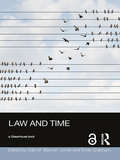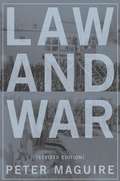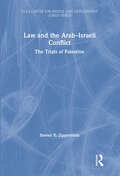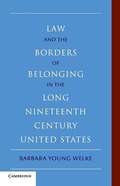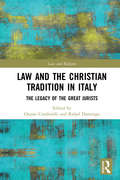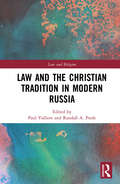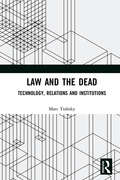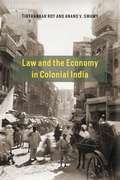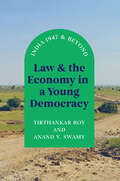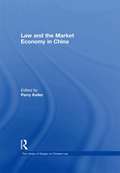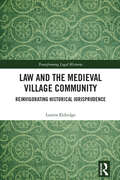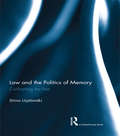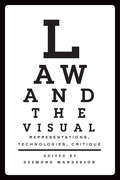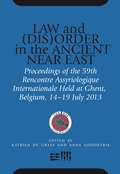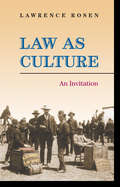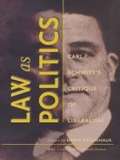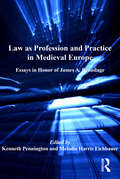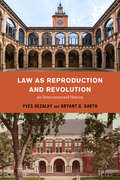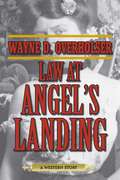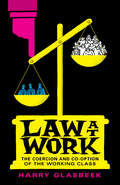- Table View
- List View
Law and Time: Things, Form, And The Enactment Of Law (Social Justice)
by Emily Grabham Sian Beynon-JonesResearch on law's relationship with time has flourished over the past decade. This edited collection aims to put law and time scholarship into wider context, advancing conversations on time and temporalities between socio-legal scholars, anthropologists, sociologists, geographers and historians. Through a diverse range of contributions, the collection explores how legal modalities of time emerge and have effects within wider clusters of social and political action. Themes include: law’s diverse roles in maintaining linear historicist models of time; law’s participation in the materialisation of times; and the unsteady effects of temporal pluralism and polytemporalities in law. De-naturalising the ‘time’ in law and time scholarship, this collection positions time as something that can be enacted and materialised as well as experienced, with distinct implications for questions of social justice.
Law and War: International Law and American History
by Peter MaguireIn this classic text, Peter Maguire follows America's legal relationship with war, both before and after the Nuremberg trials of the 1940s. Maguire argues that the precedents set by the trials were nothing less than revolutionary, and he traces the development of these new attitudes throughout American history. The text has been revised throughout, with a new preface and postscript discussing the George W. Bush administration's attempt to rewrite the laws of war after 9/11. Maguire connects these efforts to the decline in American power and reputation.
Law and power in the making of the roman commonwealth
by Laura Kopp Luigi Capogrossi ColognesiWith a broad chronological sweep, this book provides an historical account of Roman law and legal institutions which explains how they were created and modified in relation to political developments and changes in power relations. It underlines the constant tension between two central aspects of Roman politics: the aristocratic nature of the system of government, and the drive for increased popular participation in decision-making and the exercise of power. The traditional balance of power underwent a radical transformation under Augustus, with new processes of integration and social mobility brought into play. Professor Capogrossi Colognesi brings into sharp relief the deeply political nature of the role of Roman juridical science as an expression of aristocratic politics and discusses the imperial jurists' fundamental contribution to the production of an outline theory of sovereignty and legality which would constitute, together with Justinian's gathering of Roman legal knowledge, the most substantial legacy of Rome.
Law and the Arab–Israeli Conflict: The Trials of Palestine (UCLA Center for Middle East Development (CMED) series)
by Steven E. ZippersteinDuring the British Mandate for Palestine (1922–1948), Arabs and Jews repeatedly used the law to gain leverage and influence international opinion, especially in three dramatic and largely forgotten trials involving two issues: the interplay between conflicting British promises to the Arabs and Jews during World War I, and the parties’ rights and claims to the Wailing Wall. Focusing on how all three parties – Arab, Jewish, and British – used the law and the legal process to advance their objectives during the Mandate years, this volume reveals how the parties availed themselves – with varying degrees of success – of the law and the legal process. The book examines various legal arguments they proffered, and how that early tendency to resort to the law as a tool, a resource, and a weapon in the conflict has continued to this day. The research relies almost entirely on primary source documents, including transcripts of the public and secret testimony before the Shaw, Lofgren, and Peel Commissions, diaries, letters, government files, and other original sources. This study explores the origins of many of the fundamental legal arguments in the Arab–Israeli conflict that prevail to this day. Filling a gap in research, this is a key text for scholars and students interested in the Arab–Israeli conflict, Lawfare, and the Middle East.
Law and the Borders of Belonging in the Long Nineteenth Century United States
by Barbara Young WelkeFor more than a generation, historians and legal scholars have documented inequalities at the heart of American law and daily life and exposed inconsistencies in the generic category of “American citizenship.” Welke draws on that wealth of historical, legal, and theoretical scholarship to offer a new paradigm of liberal selfhood and citizenship from the founding of the United States through the 1920s. Law and the Borders of Belonging questions understanding this period through a progressive narrative of expanding rights, revealing that it was characterized instead by a sustained commitment to borders of belonging of liberal selfhood, citizenship, and nation in which able white men’s privilege depended on the subject status of disabled persons, racialized others, and women. Welke’s conclusions pose challenging questions about the modern liberal democratic state that extend well beyond the temporal and geographic boundaries of the long nineteenth century United States.
Law and the Brontës
by Ian WardIn its exploration of legal issues presented in novels of the Brontë sisters, this book represents a significant and original contribution to the study, not just of the Brontës and the mid-nineteenth century 'woman's novel', but also the situation of women in nineteenth century English law and the debates which moved around its prospective reform.
Law and the Christian Tradition in Italy: The Legacy of the Great Jurists (Law and Religion)
by Rafael Domingo Orazio CondorelliFirmly rooted on Roman and canon law, Italian legal culture has had an impressive influence on the civil law tradition from the Middle Ages to present day, and it is rightly regarded as "the cradle of the European legal culture." Along with Justinian’s compilation, the US Constitution, and the French Civil Code, the Decretum of Master Gratian or the so-called Glossa ordinaria of Accursius are one of the few legal sources that have influenced the entire world for centuries. This volume explores a millennium-long story of law and religion in Italy through a series of twenty-six biographical chapters written by distinguished legal scholars and historians from Italy and around the world. The chapters range from the first Italian civilians and canonists, Irnerius and Gratian in the early twelfth century, to the leading architect of the Second Vatican Council, Pope Paul VI. Between these two bookends, this volume offers notable case studies of familiar civilians like Bartolo, Baldo, and Gentili and familiar canonists like Hostiensis, Panormitanus, and Gasparri but also a number of other jurists in the broadest sense who deserve much more attention especially outside of Italy. This diversity of international and methodological perspectives gives the volume its unique character. The book will be essential reading for academics working in the areas of Legal History, Law and Religion, and Constitutional Law and will appeal to scholars, lawyers, and students interested in the interplay between religion and law in the era of globalization.
Law and the Christian Tradition in Modern Russia (Law and Religion)
by Paul Valliere and Randall A. PooleThis book, authored by an international group of scholars, focuses on a vibrant central current within the history of Russian legal thought: how Christianity, and theistic belief generally, has inspired the aspiration to the rule of law in Russia, informed Russian philosophies of law, and shaped legal practices. Following a substantial introduction to the phenomenon of Russian legal consciousness, the volume presents twelve concise, non-technical portraits of modern Russian jurists and philosophers of law whose thought was shaped significantly by Orthodox Christian faith or theistic belief. Also included are chapters on the role the Orthodox Church has played in the legal culture of Russia and on the contribution of modern Russian scholars to the critical investigation of Orthodox canon law. The collection embraces the most creative period of Russian legal thought—the century and a half from the later Enlightenment to the Russian emigration following the Bolshevik Revolution. This book will merit the attention of anyone interested in the connections between law and religion in modern times.
Law and the Dead: Technology, Relations and Institutions
by Marc TrabskyThe governance of the dead in the eighteenth and nineteenth centuries gave rise to a new arrangement of thanato-politics in the West. Legal, medical and bureaucratic institutions developed innovative technologies for managing the dead, maximising their efficacy and exploiting their vitality. Law and the Dead writes a history of their institutional life in the nineteenth and twentieth centuries. With a particular focus on the technologies of the death investigation process, including place-making, the forensic gaze, bureaucratic manuals, record-keeping and radiography, this book examines how the dead came to be incorporated into legal institutions in the modern era. Drawing on the writings of philosophers, historians and legal theorists, it offers tools for thinking through how the dead dwell in law, how their lives persist through the conduct of office, and how coroners assume responsibility for taking care of the dead. This historical and interdisciplinary book offers a provocative challenge to conventional thinking about the sequestration of the dead in the nineteenth and twentieth centuries. It asks the reader to think through and with legal institutions when writing a history of the dead, and to trace the important role assumed by coroners in the governance of the dead. This book will be of interest to scholars working in law, history, sociology and criminology.
Law and the Economy in Colonial India
by Tirthankar Roy Anand V. SwamySince the economic reforms of the 1990s, India's economy has grown rapidly. To sustain growth and foreign investment over the long run requires a well-developed legal infrastructure for conducting business, including cheap and reliable contract enforcement and secure property rights. But it's widely acknowledged that India's legal infrastructure is in urgent need of reform, plagued by problems, including slow enforcement of contracts and land laws that differ from state to state. How has this situation arisen, and what can boost business confidence and encourage long-run economic growth? Tirthankar Roy and Anand V. Swamy trace the beginnings of the current Indian legal system to the years of British colonial rule. They show how India inherited an elaborate legal system from the British colonial administration, which incorporated elements from both British Common Law and indigenous institutions. In the case of property law, especially as it applied to agricultural land, indigenous laws and local political expediency were more influential in law-making than concepts borrowed from European legal theory. Conversely, with commercial law, there was considerable borrowing from Europe. In all cases, the British struggled with limited capacity to enforce their laws and an insufficient knowledge of the enormous diversity and differentiation within Indian society. A disorderly body of laws, not conducive to production and trade, evolved over time. Roy and Swamy's careful analysis not only sheds new light on the development of legal institutions in India, but also offers insights for India and other emerging countries through a look at what fosters the types of institutions that are key to economic growth.
Law and the Economy in a Young Democracy: India 1947 and Beyond (Markets and Governments in Economic History)
by Tirthankar Roy Anand V. SwamyAn essential history of India's economic growth since 1947, including the legal reforms that have shaped the country in the shadow of colonial rule. Economists have long lamented how the inefficiency of India's legal system undermines the country’s economic capacity. How has this come to be? The prevailing explanation is that the postcolonial legal system is understaffed and under-resourced, making adjudication and contract enforcement slow and costly. Taking this as given, Law and the Economy in a Young Democracy examines the contents and historical antecedents of these laws, including how they have stifled economic development. Economists Roy and Swamy argue that legal evolution in independent India has been shaped by three factors: the desire to reduce inequality and poverty; the suspicion that market activity, both domestic and international, can be detrimental to these goals; and the strengthening of Indian democracy over time, giving voice to a growing fraction of society, including the poor. Weaving the story of India's heralded economic transformation with its social and political history, Roy and Swamy show how inadequate legal infrastructure has been a key impediment to the country's economic growth during the last century. A stirring and authoritative history of a nation rife with contradictions, Law and the Economy in a Young Democracy is essential reading for anyone seeking to understand India's current crossroads—and the factors that may keep its dreams unrealized.
Law and the Economy in a Young Democracy: India 1947 and Beyond (Markets and Governments in Economic History)
by Tirthankar Roy Anand V. SwamyAn essential history of India's economic growth since 1947, including the legal reforms that have shaped the country in the shadow of colonial rule. Economists have long lamented how the inefficiency of India's legal system undermines the country’s economic capacity. How has this come to be? The prevailing explanation is that the postcolonial legal system is understaffed and under-resourced, making adjudication and contract enforcement slow and costly. Taking this as given, Law and the Economy in a Young Democracy examines the contents and historical antecedents of these laws, including how they have stifled economic development. Economists Roy and Swamy argue that legal evolution in independent India has been shaped by three factors: the desire to reduce inequality and poverty; the suspicion that market activity, both domestic and international, can be detrimental to these goals; and the strengthening of Indian democracy over time, giving voice to a growing fraction of society, including the poor. Weaving the story of India's heralded economic transformation with its social and political history, Roy and Swamy show how inadequate legal infrastructure has been a key impediment to the country's economic growth during the last century. A stirring and authoritative history of a nation rife with contradictions, Law and the Economy in a Young Democracy is essential reading for anyone seeking to understand India's current crossroads—and the factors that may keep its dreams unrealized.
Law and the Market Economy in China (The\library Of Essays On Chinese Law Ser.)
by Perry KellerThis volume concerns several aspects of China's changing market based economy. These include commercial contract enforcement, corporate structures, competition law and other issues related to China's membership in the WTO. In the past two decades, the rapid integration of China's economy into the global marketplace has created obligations and expectations of non-discrimination and regulatory transparency in domestic markets. The Chinese government has responded by demanding better governance within major companies, market sectors and public administration generally. However, as the articles in this volume show, it has struggled to find a corporate structure capable of absorbing external equity investment and participation but still amenable to direct and indirect state guidance. It has also moved cautiously in creating legal controls over unfair competition. Moreover, the protection of state owned enterprises, which serve as vehicles for domestic economic, social and political policy, has been a recurring issue in China's WTO trade disputes.
Law and the Medieval Village Community: Reinvigorating Historical Jurisprudence (Transforming Legal Histories)
by Lorren EldridgeThis book expands on established doctrine in legal history and sets out a challenge for legal philosophers. The English medieval village community offers a historical and philosophical lens on the concept of custom which challenges accepted notions of what law is. The book traces the study of the medieval village community from early historical works in the nineteenth century through to current research. It demonstrates that some law-making can and has been ‘bottom-up’ in English law, with community-led decisionmaking having a particularly important role in the early common law. The detailed consideration of law in the English village community reveals alternative ways of making and conceiving of law which are not dependent on state authority, particularly in relation to customary and communal property rights. Acknowledging this poses challenges for legal theory: the legal positivism that dominates Western legal philosophy tends to reject custom as a source of law. However, this book argues that medieval customary law ought to be considered ‘law’ if we are ever going to fully understand law – both then and now. The book will be a valuable resource for researchers and academics working in the areas of Legal History, Legal Theory, and Jurisprudence.
Law and the Modern Mind: Consciousness and Responsibility in American Legal Culture
by Susanna L. BlumenthalHeadline-grabbing murders are not the only cases in which sanity has been disputed in the American courtroom. Susanna Blumenthal traces this litigation, revealing how ideas of human consciousness, agency, and responsibility have shaped American jurisprudence as judges struggled to reconcile Enlightenment rationality with new sciences of the mind.
Law and the Politics of Memory: Confronting the Past
by Stiina LoytomakiLaw and the Politics of Memory: Confronting the Past examines law’s role as a tool of memory politics in the efforts of contemporary societies to work through the traumas of their past. Using the examples of French colonialism and Vichy, as well as addressing the politics of memory surrounding the Holocaust, communism and colonialism, this book provides a critical exploration of law’s role in ‘belated’ transitional justice contexts. The book examines how and why law has become so central in processes in which the past is constituted as a series of injustices that need to be rectified and can allegedly be repaired. As such, it explores different legal modalities in processes of working through the past; addressing the implications of regulating history and memory through legal categories and legislative acts, whilst exploring how trials, restitution cases, and memory laws manage to fulfil such varied expectations as clarifying truth, rendering homage to memory and reconciling societies. <P><P> Legal scholars, historians and political scientists, especially those working with transitional justice, history and memory politics in particular, will find this book a stimulating exploration of the specificity of law as an instrument and forum of the politics of memory.
Law and the Visual: Transition, Transformation, Transmission
by Desmond MandersonIn Law and the Visual, leading legal theorists, art historians, and critics come together to present new work examining the intersection between legal and visual discourses. Proceeding chronologically, the volume offers leading analyses of the juncture between legal and visual culture as witnessed from the fifteenth to the twenty-first centuries. Editor Desmond Manderson provides a contextual introduction that draws out and articulates three central themes: visual representations of the law, visual technologies in the law, and aesthetic critiques of law. A ground breaking contribution to an increasingly vibrant field of inquiry, Law and the Visual will inform the debate on the relationship between legal and visual culture for years to come.
Law and: Proceedings of the 59th Rencontre Assyriologique Internationale Held at Ghent, Belgium, 15–19 July 2013 (Rencontre Assyriologique Internationale #59)
by Katrien De Graef, Anne GoddeerisMesopotamia is often considered to be the birthplace of law codes. In recognition of this fact and motivated by the perennial interest in the topic among Assyriologists, the 59th Rencontre Assyriologique Internationale was organized in Ghent in 2013 around the theme "Law and (Dis)Order in the Ancient Near East." Based on papers delivered at that meeting, this volume contains twenty-six essays that focus on archaeological, philological, and historical topics related to order and chaos in the Ancient Near East. Written by a diverse array of international scholars, the contributions to this book explore laws and legal practices in the Ur III, Old Babylonian, Middle Assyrian, and Neo-Assyrian periods in Mesopotamia, as well as in Nuzi and the Hebrew Bible. Among the subjects covered are the Code of Hammurabi, legal phraseology, the archaeological traces of the organization of community life, and biblical law. The volume also contains essays that explore the concepts of chaos/disorder and law/order in divinatory texts and literature.Wide-ranging and cutting-edge, the essays in this collection will be of interest to Assyriologists, especially members of the International Association for Assyriology.
Law and: Proceedings of the 59th Rencontre Assyriologique Internationale Held at Ghent, Belgium, 15–19 July 2013 (Rencontre Assyriologique Internationale)
by Katrien De Graef, Anne GoddeerisMesopotamia is often considered to be the birthplace of law codes. In recognition of this fact and motivated by the perennial interest in the topic among Assyriologists, the 59th Rencontre Assyriologique Internationale was organized in Ghent in 2013 around the theme “Law and (Dis)Order in the Ancient Near East.” Based on papers delivered at that meeting, this volume contains twenty-six essays that focus on archaeological, philological, and historical topics related to order and chaos in the Ancient Near East. Written by a diverse array of international scholars, the contributions to this book explore laws and legal practices in the Ur III, Old Babylonian, Middle Assyrian, and Neo-Assyrian periods in Mesopotamia, as well as in Nuzi and the Hebrew Bible. Among the subjects covered are the Code of Hammurabi, legal phraseology, the archaeological traces of the organization of community life, and biblical law. The volume also contains essays that explore the concepts of chaos/disorder and law/order in divinatory texts and literature.Wide-ranging and cutting-edge, the essays in this collection will be of interest to Assyriologists, especially members of the International Association for Assyriology.
Law as Culture: An Invitation
by Lawrence RosenLaw is integral to culture, and culture to law. Often considered a distinctive domain with strange rules and stranger language, law is actually part of a culture's way of expressing its sense of the order of things. In Law as Culture, Lawrence Rosen invites readers to consider how the facts that are adduced in a legal forum connect to the ways in which facts are constructed in other areas of everyday life, how the processes of legal decision-making partake of the logic by which the culture as a whole is put together, and how courts, mediators, or social pressures fashion a sense of the world as consistent with common sense and social identity. While the book explores issues comparatively, in each instance it relates them to contemporary Western experience. The development of the jury and Continental legal proceedings thus becomes a story of the development of Western ideas of the person and time; African mediation techniques become tests for the style and success of similar efforts in America and Europe; the assertion that one's culture should be considered as an excuse for a crime becomes a challenge to the relation of cultural norms and cultural diversity. Throughout the book, the reader is invited to approach law afresh, as a realm that is integral to every culture and as a window into the nature of culture itself.
Law as Politics: Carl Schmitt’s Critique of Liberalism
by David DyzenhausWhile antiliberal legal theorist Carl Schmitt has long been considered by Europeans to be one of this century's most significant political philosophers, recent challenges to the fundamental values of liberal democracies have made Schmitt's writings an unavoidable subject of debate in North America as well. In an effort to advance our understanding not only of Schmitt but of current problems of liberal democracy, David Dyzenhaus presents translations of classic German essays on Schmitt alongside more recent writings by distinguished political theorists and jurists. Neither a defense of nor an attack on Schmitt, Law as Politics offers the first balanced response to his powerful critique of liberalism. One of the major players in the 1920s debates, an outspoken critic of the Versailles Treaty and the Weimar Constitution, and a member of the Nazi party who provided juridical respectability to Hitler's policies, Schmitt contended that people are a polity only to the extent that they share common enemies. He saw the liberal notion of a peaceful world of universal citizens as a sheer impossibility and attributed the problems of Weimar to liberalism and its inability to cope with pluralism and political conflict. In the decade since his death, Schmitt's writings have been taken up by both the right and the left and scholars differ greatly in their evaluation of Schmitt's ideas. Law as Politics thematically organizes in one volume the varying engagements and confrontations with Schmitt's work and allows scholars to acknowledge--and therefore be in a better position to negotiate--an important paradox inscribed in the very nature of liberal democracy. Law as Politics will interest political philosophers, legal theorists, historians, and anyone interested in Schmitt's relevance to current discussions of liberalism.Contributors. Heiner Bielefeldt, Ronald Beiner, Ernst-Wolfgang Bockenforde, Renato Cristi, David Dyzenhaus, Robert Howse, Ellen Kennedy, Dominique Leydet, Ingeborg Maus, John P. McCormick, Reinhard Mehring, Chantal Mouffe, William E. Scheuerman, Jeffrey Seitzer
Law as Profession and Practice in Medieval Europe: Essays in Honor of James A. Brundage
by Kenneth Pennington Melodie Harris EichbauerThis volume brings together papers by a group of scholars, distinguished in their own right, in honour of James Brundage. The essays are organised into four sections, each corresponding to an important focus of Brundage's scholarly work. The first section explores the connection between the development of medieval legal and constitutional thought. Thomas Izbicki, Kenneth Pennington, and Charles Reid, Jr. explore various aspects of the jurisprudence of the Ius commune, while James Powell, Michael Gervers and Nicole Hamonic, Olivia Robinson, and Elizabeth Makowski examine how that jurisprudence was applied to various medieval institutions. Brian Tierney and James Muldoon conclude this section by demonstrating two important points: modern ideas of consent in the political sphere and fundamental principles of international law attributed to sixteenth century jurists like Hugo Grotius have deep roots in medieval jurisprudential thought. Patrick Zutshi, R. H. Helmholz, Peter Landau, Marjorie Chibnall, and Edward Peters have written essays that augment Brundage's work on the growth of the legal profession and how traces of a legal education began to emerge in many diverse arenas. The influence of legal thinking on marriage and sexuality was another aspect of Brundage's broad interests. In the third section Richard Kay, Charles Donahue, Jr., and Glenn Olsen explore the intersection of law and marriage and the interplay of legal thought on a central institution of Christian society. The contributions of Jonathan Riley-Smith and Robert Somerville in the fourth section round-out the volume and are devoted to Brundage's path-breaking work on medieval law and the crusading movement. The volume also includes a comprehensive bibliography of Brundage's work.
Law as Reproduction and Revolution: An Interconnected History
by Bryant G. GarthA free open access ebook is available upon publication. Learn more at www.luminosoa.org This sweeping book details the extent to which the legal revolution emanating from the US has transformed legal hierarchies of power across the globe, while also analyzing the conjoined global histories of law and social change from the Middle Ages to today. It examines the global proliferation of large corporate law firms—a US invention—along with US legal education approaches geared toward those corporate law firms. This neoliberal-inspired revolution attacks complacent legal oligarchies in the name of America-inspired modernism. Drawing on the combined histories of the legal profession, imperial transformations, and the enduring and conservative role of cosmopolitan elites at the top of legal hierarchies, the book details case studies in India, Hong Kong, South Korea, Japan, and China to explain how interconnected legal histories are stories of both revolution and reproduction. Theoretically and methodologically ambitious, it offers a wholly new approach to studying interrelated fields across time and geographies.
Law at Angel's Landing: A Western Story
by Wayne D. OverholserA gold rush threatens to break the peace of a quiet Colorado town.Angel's Landing was the mining town that grew up around a gold strike in the hills of Colorado. But the boom was long ago, and now the town is a whisper of what it once was. Mark Girard was a young boy when he witnessed firsthand what happened to a town when all of its residents vanished. It was a simple, quiet life that Mark had chosen to lead, and he and his closest friends much preferred it to the wild boom times.When the job as sheriff for Bremer County opened, Mark ran for the office and won. It was a relatively easy job, until news broke that there was a new gold strike on Banjo Creek. It quickly became clear that the boom days were about to return, and with them the wild lawlessness that accompanies a gold rush.Will Mark have the courage and the wits to keep Angel's Landing from descending into chaos? With Law at Angel's Landing, acclaimed Western author Wayne Overholser paints a vivid picture of untamed life in the American frontier.
Law at Work: The Coercion and Co-option of the Working Class
by Harry GlasbeekIn a series of illuminating essays, the renowned Harry Glasbeek unpacks how law has been used to ensure that workers' aspirations are kept in check. Law at Work uncovers how the legal system, through its structures and mechanisms, legitimizes and reinforces the exploitation of workers. Using historic and contemporary examples, Glasbeek illustrates how conscious manipulations of law are part and parcel of how law protects capitalists at the expense of workers. He proves how the very laws designed to safeguard rights and freedoms often act as invisible shackles, compelling readers to reflect on their own struggles as they navigate a world where the legal system fails to serve their interests. These manipulations are made to look innocent because the underlying structures and ideology which give rise to specific rules are not challenged or challengeable. This thought-provoking book is an indispensable resource for those seeking to understand the hidden dynamics of worker oppression, empowering readers to question prevailing narratives and envision a future where the law truly serves the interests of all.
